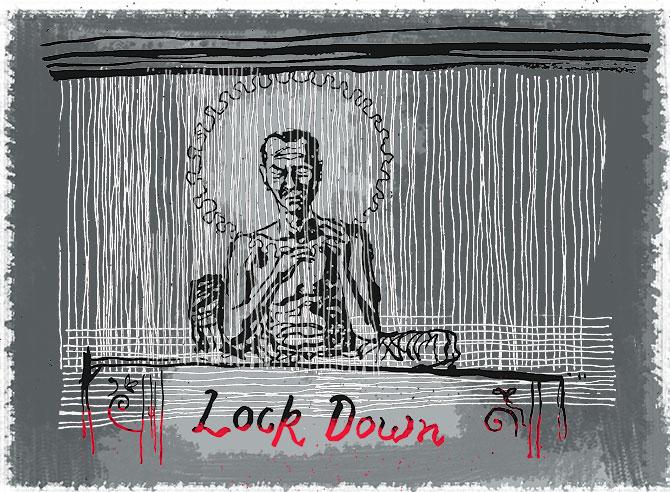'I'll survive for a month, but worry about what will happen if the lockdown isn't eased after that.'
Geetanjali Krishna reports.
Illustration: Dominic Xavier/Rediff.com

The country has been forced to become aware of the plight of thousands of migrant, daily wage labourers during the lockdown in the country's metros.
However, as a lifelong supporter of India's craft sector, I have been equally concerned about the plight of craftspeople across the country during this time.
For craft is largely a rural livelihood; craftspeople have limited direct access to the market and most of them live off only what they can make and sell.
Small, mostly self-employed and dependent on seasonal exhibitions in cities or larger companies for orders, craftspeople have received a huge blow during this ongoing lockdown.
Yet, in spite of being a sector that supports so many sustainable rural livelihoods, the government has made few provisions for craftspeople to help them tide over the COVID-19 pandemic.
I had the opportunity to speak to 28-year-old Laddu Mahto of Bihar's Darbhanga district, who weaves hand-knotted carpets in a village at Mirzapur in Uttar Pradesh.
"I have been weaving carpets here for the last five years and earn on a piece-rate basis," he told me. "All the money I earn is sent back to support my family back home."
Before the lockdown, he'd notch up about Rs 6,000 per month, sometimes more, depending on how productive he was.
Mahto is the only wage earner in his family comprising his wife and four school-going children.
"So far, my wife is somehow making ends meet from the money I'd last been able to send her a month ago," he said.
How long did he estimate he could manage like this, I asked.
"I guess I'll survive for a month, but worry about what will happen if the lockdown isn't eased after that," Mahto said.
The day we spoke, the company he weaves carpets for, sent him a food packet that he reckons would sustain him for a month.
But Mahto was worried about what would happen if the lockdown is extended and he's unable to earn any money.
"What will happen to my family back home?" he said.
"As I don't have any savings and neither do I have any land to sell... I don't think they will survive for long if I don't earn."
Mahto was one of the few migrant weavers who decided to stay in Mirzapur when the lockdown was declared.
Many others have returned to their villages and the fear in the carpet industry is that they might not return once things normalise.
In fact, craft sector activists fear that across India, craftspeople are going to be forced into other occupations to tide over the huge financial crisis created by the lockdown.
Demonetisation, the Goods and Services Tax and now this pandemic have demonstrated the lack of economic security provided by the government to this sector.
For years, the crafts lobby has been advocating that the government help vulnerable craftspeople by enabling them to practise their craft under its employment guarantee schemes and also enable them to gain direct access to the urban markets.
Since the implementation of the new GST regime, they have further argued for the urgent need for the craft sector to be made tax-free.
Perhaps this is the last window of opportunity for the government to take measures to aid this beleaguered sector.
Else much of India's rich and diverse craft tradition could join the COVID-19 pandemic's growing list of casualties.











